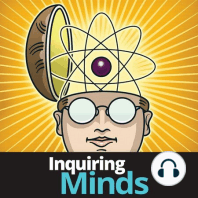45 min listen
36 Harry Collins - Why Googling Doesn't Make You a Scientific Expert
FromInquiring Minds
ratings:
Length:
55 minutes
Released:
May 30, 2014
Format:
Podcast episode
Description
Remember "Climategate"? It was the 2009 non-scandal scandal in which a trove of climate scientists' emails, pilfered from the University of East Anglia in the UK, were used to call all of modern climate research into question. Why? Largely because a cursory reading of those emails—showing climate scientists frankly discussing how to respond to burdensome data requests and attacks on their work, among other content—showed a side of researchers that most people aren't really used to seeing. Suddenly, these "experts" looked more like ordinary human beings who speak their minds, who sometimes have emotions and rivalries with one another, and (shocker) don't really like people who question the validity of their knowledge.
In other words, Climategate demonstrated something that sociologists of science, or those in the so-called field of "science studies," have know for some time—that scientists are mortals, just like all the rest of us. "What was being exposed was not something special and local but 'business as usual' across the whole scientific world," writes Cardiff University scholar Harry Collins, one of the original founders of the field of "science studies," in his masterful new book, Are We All Scientific Experts Now? But that means that Climategate didn't undermine the case for human-caused global warming at all, says Collins. Rather, it demonstrated why it is so hard for ordinary citizens, who don't have a lot of experience of how the scientific community works, to understand what is going on inside of it—much less to snipe and criticize from the outside.
That's a case that Collins makes not only about the climate issue—but also to rebut vaccine deniers, HIV-AIDS skeptics, and all manner of scientific cranks and mavericks. All of them, he argues, are failing to understand what's so important and powerful about a group of experts coming to a scientific consensus.
On the show this week we talked to Collins about why scientific expertise matters—especially in a world where more and more people are getting their answers from Google searches.
iTunes: itunes.apple.com/us/podcast/inquiring-minds/id711675943
RSS: feeds.feedburner.com/inquiring-minds
Stitcher: stitcher.com/podcast/inquiring-minds
In other words, Climategate demonstrated something that sociologists of science, or those in the so-called field of "science studies," have know for some time—that scientists are mortals, just like all the rest of us. "What was being exposed was not something special and local but 'business as usual' across the whole scientific world," writes Cardiff University scholar Harry Collins, one of the original founders of the field of "science studies," in his masterful new book, Are We All Scientific Experts Now? But that means that Climategate didn't undermine the case for human-caused global warming at all, says Collins. Rather, it demonstrated why it is so hard for ordinary citizens, who don't have a lot of experience of how the scientific community works, to understand what is going on inside of it—much less to snipe and criticize from the outside.
That's a case that Collins makes not only about the climate issue—but also to rebut vaccine deniers, HIV-AIDS skeptics, and all manner of scientific cranks and mavericks. All of them, he argues, are failing to understand what's so important and powerful about a group of experts coming to a scientific consensus.
On the show this week we talked to Collins about why scientific expertise matters—especially in a world where more and more people are getting their answers from Google searches.
iTunes: itunes.apple.com/us/podcast/inquiring-minds/id711675943
RSS: feeds.feedburner.com/inquiring-minds
Stitcher: stitcher.com/podcast/inquiring-minds
Released:
May 30, 2014
Format:
Podcast episode
Titles in the series (100)
25 Neil deGrasse Tyson - Finally, Science Is Cool: Last week, Fox's and National Geographic's new Cosmos series set a new milestone in television history. According to National Geographic, it was the largest global rollout of a TV series ever, appearing on 220 channels in 181 countries, and 45 languages. by Inquiring Minds
